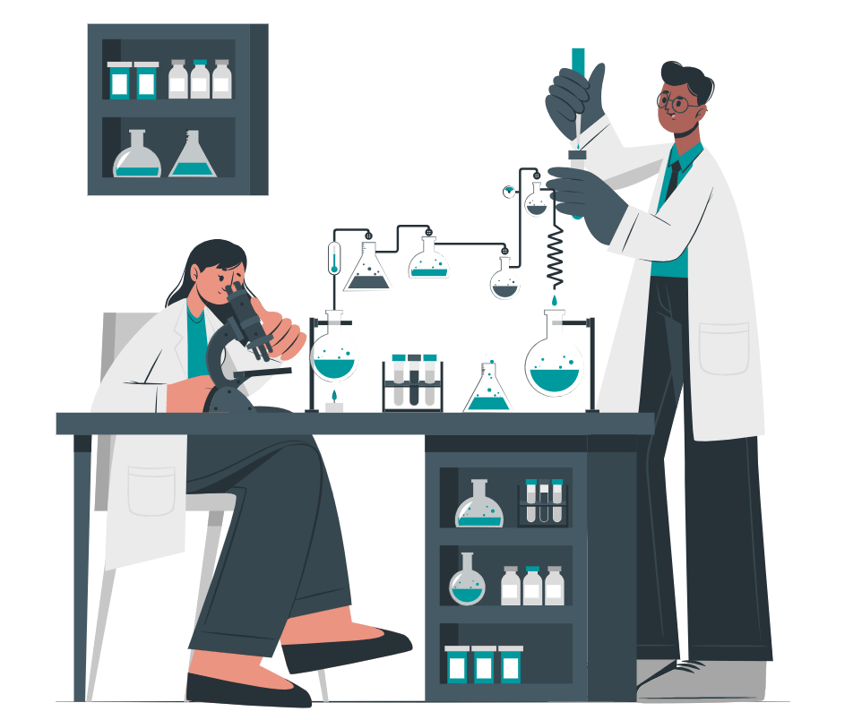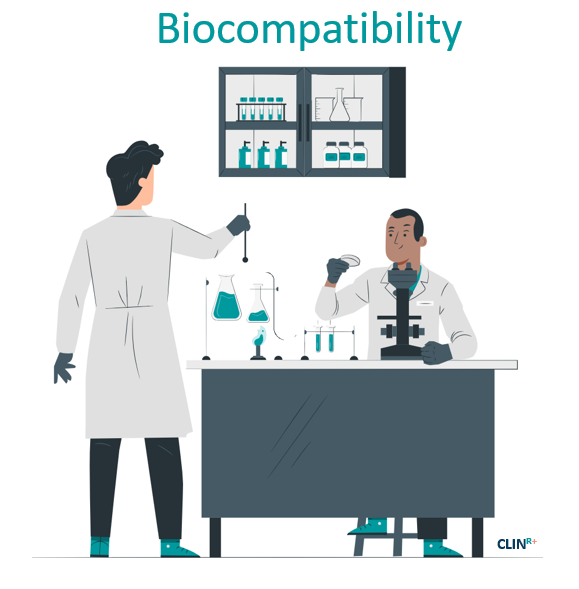Problematic biocompatibility workflows that did not meet EU MDR compliance
An innovative Implantable Medical Device manufacturer engaged CLIN-r+ to support its Regulatory Department close off a major non-conformity which was also impacting their EU MDR assessment. Specifically, CLIN-r+ was tasked to help overcome the gaps in the biocompatibility workflows and validations due to:
- Not meeting the new ISO 10993-17 and 18.
- Missing Biocompatibility Evaluation Plan’s (BEP) created by a biocompatibility team that meet ISO 10993 requirements.
- Missing a Toxicological Risk Assessments (TRA) and no toxicologist to assist in creating and signing off.
- Missing Biocompatibility Evaluation Report’s (BER) that also summarises safety endpoints, justification, and final benefit risk assessments.
- No in-house EU MDR QA workflows for Biocompatibility and no in-house biocompatibility expertise that meet ISO 10993 to validate signing of plans and reports.
The manufacturer identified the risk that their Biocompatibility QMS workflow was inadequate after receiving feedback during their EU MDR assessment. They also had no in-house experience as they contracted biocompatibility testing to third party testing labs and were not informed of the EU MDR needs and the changes to ISO 10993 that impacted their compliance. As such the client appointed CLIN-r+ to remediate their Biocompatibility workflows and address the gaps in their device’s biocompatibility files.
The purpose of the project was to close off the QMS audit, amend current biocompatibility documentation to meet Chapter II section 10.4 and the current ISO 10993-series requirements to secure CE mark.

The Challenge
CLIN-r+ knows the need for accessibility and collaboration, so we delivered a live virtual platform within 48 hours with a centralized project plan to keep stakeholders informed.
CLIN-r+ was appointed to close-off the non-conformance findings and secure the manufacturers EU MDR extension by updating their current biocompatibility workflows and to provide biocompatibility plans to meet the data requirements for both FDA and EU MDR Technical Document.
During the project discovery stage, CLIN-r+ found shortfalls such as:
- Biocompatibility evaluation file (BEF) for EU MDR submission missing plans.
- Incorrect testing methodologies.
- Missing endpoints.
- No toxicology assessments and reports.
The manufacturer needed clarity on the amount of work, timelines and resources required from the business unit. The company needed the biocompatibility evaluation reports (BER) data within 6 months to meet their second round EU MDR assessment. The client initiated the project through an EU MDR Biocompatibility gap assessment, so CLIN-r+ was able to conduct a thorough review of the technical file and QMS procedures.
The CLIN-r+ Solution
The review of the client’s gap assessment by CLIN-r+ identified further efficiencies.
We have designed our gap assessment to not only close off the non-conformities but to highlight the gaps in meeting both EU and US (FDA) biocompatibility standards. Beyond the provision of a BEP, the manufacturer needed to remediate QMS processes (validation of test labs) and redo testing as their current providers did not meet GLP. CLIN-r+ highlighted this as a risk to their current FDA clearance and MDD extension under Article 120. The big concern was if Article 120 was not met they could have had to potentially stop selling in Europe prematurely whilst they were waiting for biocompatibility lab reports.
CLIN-r+ provided a timebound project plan with matching deliverables to meet the deadline for the next round EU MDR assessment. To do this, we:
- Provided a gap assessment and EU MDR Biocompatibility remediation project plan.
- Provided live, accurate and transparent measurement of progress. We developed a portal (within 1 week) to facilitate remote and group collaboration where the project plan and deliverables were accessed in real time by all team members and IP was maintained on the manufacturer’s portal.
- Developed a global approach for the implementation across 3 continents.
- Sourced accredited labs that could accommodate the project timelines at the right price.
- Remediated biocompatibility documentation for 3 products, managed retesting with new validated lab partners and created Biocompatibility Evaluation SOPs and templates to align the workflow for future compliance.
- Project managed the project plan board with deadlines and reminders to stakeholders to ensure timely inputs for sign-off to deadlines.
- Managed weekly huddles to ensure all team members were updated and motivated to deliver on time.
The Deliverables
CLIN-r+ conducted a ‘Kick-Off’ phase to align the project with the overall strategy. This was signed off and executed in the ‘Biocompatibility Evaluation Plan’ that forms the basis of the safety endpoints, materials worksheet (BEW) and suitable testing methodology for the labs. We also used this phase to identify suitable new partner labs that met EU MDR and FDA accreditation for future testing needs. Our toxicologists also advised on the up and coming changes to ISO 10993 standards that testing could conform to future changes.
We onboarded new testing labs and delivered an updated Biological Evaluation Plan, new testing reports, Toxicological Risk Assessment (TRA) and Biological Evaluation Reports. The manufacturer received files signed by toxicologist and biocompatibility experts that met ISO 10993 requirements. The Biocompatibility Evaluation File (BEF) now contains documents that were created, approved, and signed off by suitably qualified medical experts to meet the requirements of EU MDR, FDA, and ISO 10993 requirements.
We ran weekly huddles which provided the team with support and momentum to focus on key deliverables. It also allowed us to provide Clinical Regulatory support and fast track on workflows that the internal team were not confident to progress.
CLIN-r+ provided a live project plan dashboard to give transparency on progress and a point of collaboration so that the multiple sites and department inputs were centralised in one area. This also provided live updates to executives on the project progress with restricted access to year to date (YTD) progress and project budget.
CLIN-r+ formulated and provided an QMS process remediation of the following workstreams:

- Biological Evaluation workflows.
- Vendor validation of third party laboratories.
- Service level agreement of third party laboratories providing biocompatibility testing.
Once the project was completed, CLIN-r+ signed out from the project portal and handed over the future management of biocompatibility processes to the internal team. This also allows for the internal team to easily provide access for CLIN-r+ to support where needed in future.
The Benefits
The manufacturer had received all deliverables in the specified amount of time and in keeping with the CLIN-r+ proposal budget. Above the deliverables the project had a few noticeable benefits:
- Identification of new testing laboratories for biocompatibility – endpoint point testing that reduced 50% of testing costs against their initial testing provider. In effect, this paid for CLIN-r+ engagement and new labs testing costs to redo previous work.
- Delivery of Biocompatibility Evaluation Plan (including securing labs to start testing) within 1 month that conforms to ISO 10993. We used this to gain agreement from the Notified Body to delay the round 2 assessment by 6 months, so the manufacturer could fully address deficiencies on their round 1 feedback.
- Round 1 deficiencies were addressed and there were no further findings. The manufacturer then received full conformation of compliance of their biocompatibility documentation and QMS workflow for future submissions.
- Success in obtaining CE mark within an ambitious European launch date.
By partnering with CLIN-r+, our clients can proactively implement their strategic goals well in advance of deadlines. We keep the project on track and ensure each gap has been closed, providing the support you need, where you need it.
Should you have any questions or need professional assistance, CLIN-r+ has a wealth of experience to call upon. Get in touch!
Biocompatibility
Recent changes to ISO 10993-1 have changed the landscape of medical device biological safety testing. The toxicity test box ticking from the biocompatibility test matrix …
Read More →

ISO 18562 – Biocompatibility evaluation
ISO 18562, has become the industry standard for testing the biocompatibility of breathing components. It has four parts: general principles, evaluation of particle emission, evaluation …
Read More →

EU MDR how to structure your Medical Device Technical Document
The device’s design, intended use claims, composition, and clinical studies are all covered in great depth in the Technical Document. It serves as a device’s …
Read More →



